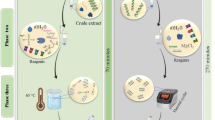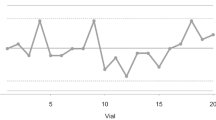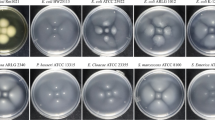Abstract
HAYWARD1 suggested in 1941 that the Nagler reaction might be used for the rapid identification of Clostridium welchii. She expanded this work later2 and directed attention to the difficulty of distinguishing between Cl. welchii and Clostridium bifermentans on serum agar plates. Both these organisms produced opalescence in the medium, and it was inhibited by Cl. welchii antitoxin. She suggested that distinction between these organisms may be made by making use of the hydrolysis of phenolphthalein phosphate as described by Bray and King3.
This is a preview of subscription content, access via your institution
Access options
Subscribe to this journal
Receive 51 print issues and online access
$199.00 per year
only $3.90 per issue
Buy this article
- Purchase on Springer Link
- Instant access to full article PDF
Prices may be subject to local taxes which are calculated during checkout
Similar content being viewed by others
References
Hayward, Nancy J., Brit. Med. J., i, 811, 916 (1941).
Hayward, Nancy J., J. Path. Bact., 55, 285 (1943).
Bray, J., and King, E. J., J. Path. Bact., 54, 287 (1942).
Reed, G. B., Dubos's “Bacterial and Mycotic Infections of Man”, 1st ed., 357 (Lippincott, Philadelphia, 1948).
Author information
Authors and Affiliations
Rights and permissions
About this article
Cite this article
WILLIS, A., HOBBS, G. A Modified Nagler Medium. Nature 180, 92–93 (1957). https://doi.org/10.1038/180092a0
Issue Date:
DOI: https://doi.org/10.1038/180092a0
Comments
By submitting a comment you agree to abide by our Terms and Community Guidelines. If you find something abusive or that does not comply with our terms or guidelines please flag it as inappropriate.



